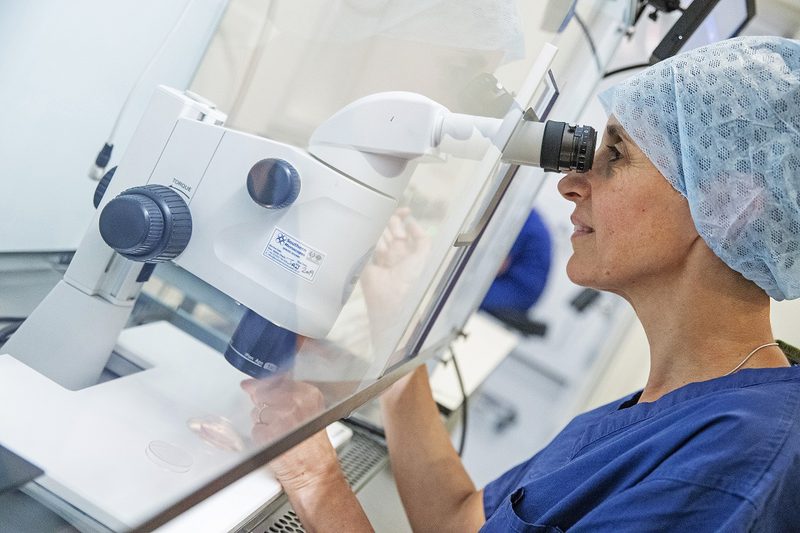Scientists literally create new human life
World Embryologist Day

On the anniversary of the birth of the world’s first IVF baby, World Embryologist Day – 25 July – senior scientists in Bristol are aiming to raise awareness of advances in fertility medicine by revealing a glimpse of their daily behind-the-scenes activities.
Jen Nisbett, senior embryologist at Bristol Centre for Reproductive Medicine (BCRM), said: “The work we do is just so exciting and rewarding – we are literally creating new life.
Jen, whose research on the use of frozen embryos has received plaudits within the fertility sector, says this makes her work both a privilege and a responsibility.
“The work we embryologists do can be at the heart of helping people to realise their dreams of becoming parents – and what a wonderful thing that is,” she said.
“Over the past 40 years we have learned so much, and there is still so much more we are discovering all the time that improves the chances of success for those struggling to have a baby.
“For people wanting to know what our work involves, it is varied, quite high-pressured and calls for a calm head and very good attention to detail.”
The activities undertaken by Jen and her colleagues at BCRM involve both lab work and patient interaction.
“Embryologists at BCRM start their working day by checking every embryo in the lab, including those in the Embryoscope (a type of incubator) for which we review a recording all of the weird and wonderful things the eggs or embryos have been doing overnight,” said Jen.
“These reviews often result in a lot of conversations, research and sometimes head-scratching which is very much part of what makes embryology such an exciting field to work in – we’re discovering new things all the time.
“If it’s the first morning after egg collection we’ll be looking at newly-retrieved eggs for any signs of fertilisation.
“We then check embryos at the day 2-6 stage, grading the quality and development from the two-cell stage all the way up to blastocysts (advanced embryos with over 50 cells), looking to see if we can choose the very best embryo from within the group to be transferred or frozen.
“After reviewing all the embryos we begin to phone our patients to update them on how their group of embryos is developing.
“This the most rewarding part of the job, but also the hardest. We want so badly for everyone to do well, and when it’s good news it’s so lovely to share it but when things aren’t going well we have to be honest and we share people’s disappointment.
“After lunch we begin mixing the prepared sperm with the freshly-collected eggs. This is really exciting but also we definitely feel a big responsibility when doing this task, and we are anxious for it to work – particularly when we’re performing Intracytoplasmic sperm injection (ICSI) and we have to choose an individual sperm.
“Most afternoons we also perform embryo transfers, which can be the most nerve-wracking part because we literally have someone’s hopes in our hands. We are always willing the little embryo on and hoping that the next time we see it, it will be a baby.
“Any good quality embryos remaining after the transfer are then vitrified, which means frozen, and part of this process must be done in a matter of seconds, requiring absolute concentration and precision.
“The advancement of techniques means embryos can be frozen and thawed for use at a later date without compromising their chance of success.
“New technology also enables certain patients to have genetic screening of their embryos.
“For this we have to carefully remove 5-10 cells from the blastocyst before putting these cells into a tiny tube, without causing any damage to the precious blastocyst.
“This is one of the most technically challenging procedures for any embryologist, and requires months of training. It’s when our steady hands and steely nerves are really tested.
“Although the training is long and vigorous, being an embryologist and part of the BCRM team is an absolute privilege, we love our job and look forward to coming into work every day.”
Further information about the assisted fertility services offered at BCRM is available at www.fertilitybristol.com , email contact@bcrm.clinic or call 01174146888.
